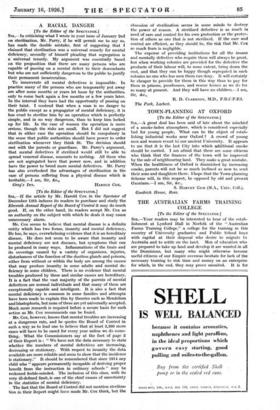A RACIAL DANGER [To the Editor of the SPECTATOR.]
Sm,—In criticizing what I wrote in your issue of January 2nd on sterilization, Mr. Parry, if he will permit me to say so, has made the double mistake, first of suggesting that I claimed that sterilization was a universal remedy for mental deficiency, secondly of himself pleading that segregation is a universal remedy. My argument was essentially based on the prOpositicin that there are many persons who are capable of passing on a mental defect to their descendants but who are not sufficiently dangerous to the public to justify their permanent incarceration.
To incarcerate all mental defectives is impossible. In practice many of the persons who are temporarily put away are after some months or years let loose by the authorities, only to come back again a few months or a few years later. In the interval they have had the opportunity of passing on their taint. I contend that when a man is no danger to the public except as a propagator of mental deficiency, it is less cruel to sterilize him by an operation which is perfectly simple, and in no way dangerous, than to keep hint locked up for life. In the case of women the operation is more serious, though the risks are small. But I did not suggest that in either case the operation should be compulsory in the sense that public authorities should have power to order sterilization whenever they think fit. The decision should rest with the parents or guardians. Mr. Parry's argument, that mental defectives if sterilized would still be able to spread venereal- disease, amounts to nothing. All those who are not segregated hive that power now, and in addition have the power to breed more mental defectives. Mr. Parry has alio overlooked the advantages of sterilization in the case of persons suffering from a physical disease which is heritable.—I am, Sir, &c.,














































 Previous page
Previous page